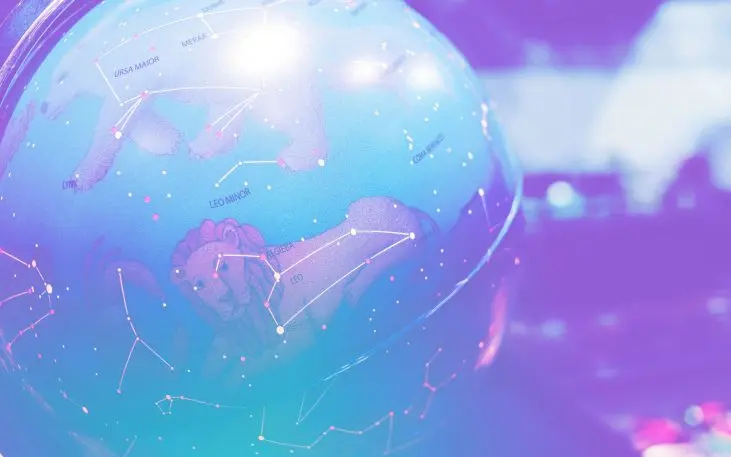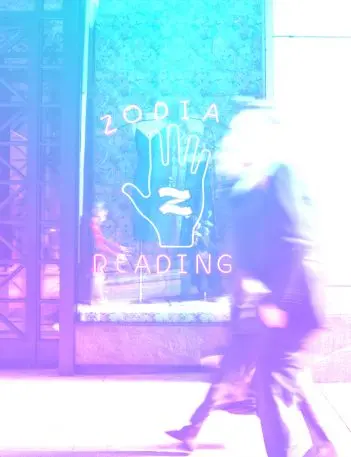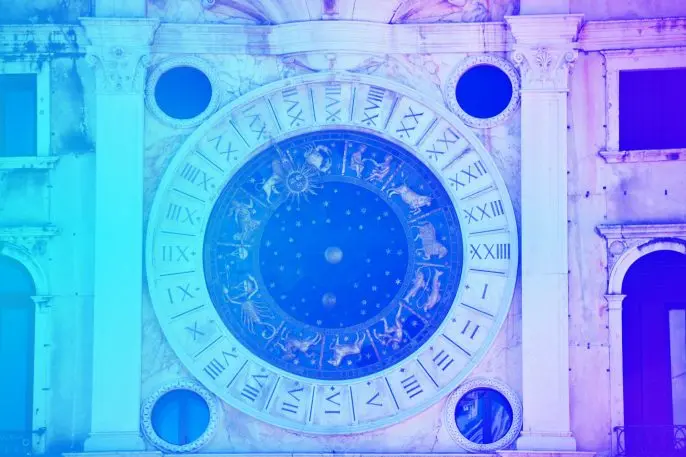When Denise* tuned into the second Democratic debate this summer, she was a little bored. “It was mayonnaise,” she says. But one thing piqued her interest: What were the candidates’ zodiac signs?
Denise did some research on candidates past and present—and it all clicked. “I think the man in the White House currently is a Gemini, and I don’t want to rag on Geminis, but that makes a lot of sense,” she says. “Former president Barack Obama is a Leo, which also makes a lot of sense. Marianne Williamson is a Cancer—and I was like, ‘Whoa, clearly!'”
If there were a starter pack meme for millennial clichés, astrology would be somewhere between avocado toast and fiddle-leaf fig tree. On Twitter, you might stumble upon the musings of the Astro Poets or the acolytes of Susan Miller, whose expansive horoscopes draw six million visitors a month. On Instagram, you can scroll endlessly through astro memes courtesy of @notallgeminis. Bumble’s dating app now lets users sort by zodiac sign, and even Amazon is selling its wares with shopping horoscopes.
Plenty of media outlets cater to the Scorpio horoscope-starved masses, too. At The Cut, Madame Clairevoyant dispenses starry wisdom through weekly readings, published alongside long-form journalism. (Just last week, the New York Times, which has never published horoscopes, explained how and why it covers the nonscientific pastime.)
It was only a matter of time, then, before zodiac signs became part of everyday office culture. When Denise tweeted her findings about presidential hopefuls’ star signs, it catalyzed a conversation at work the next day. A few hours later, she had started a Slack group with coworkers to dissect the contents of her tweet and “share funny things about astrology.”
They’re not alone. “I’ve been at my workplace for six years, and I’m really close with my coworkers,” says Paola Rodelas, 32. “And when you’re getting really excited about something, you want to talk about it.”
🌾💫 astrology + the type of coworker you are 💫🌾 (a thread)
— Suyin | Astrologer (@ayyriestrology) August 4, 2019
Denise also slips her astrological proclivities into workplace conversations. “I kind of jokingly always put my sign out there to test the waters,” she says. Like many young people, Denise, who is in her twenties, was first drawn to astrology as a medium through which to better understand herself. “I’ve always just gravitated toward things that help me articulate who I am,” she says. “Especially in a world where you can sometimes feel so lost.”
Astrology holds a multifaceted appeal. Some link its rise to a declining interest in organized religion. Others point to the rise of the self-care movement, and a more serious recognition of pastimes that skew female. “Women’s hobbies and interests are no longer just being pushed to the side and reduced to something that could be commodified,” says Aliza Kelly, an astrologer and host of the podcast Stars Like Us.
There is also money to be made in the $2.2 billion “mystical services” market—and venture capital is cashing in. Co-Star, one of a handful of astrology apps vying for investor wallets, raised more than $5 million in April. The month prior, Sanctuary made its debut with $1.5 million in its coffers, courting astrology buffs with personalized live readings.
New York Times critic-at-large Amanda Hess posits that astrology is catnip for an extremely online generation raised on personal, shareable content. Another app, named the Pattern, will “read you to filth,” according to astrology Twitter. Then there’s the matter of what happened in 2016.
“It’s kind of the perfect storm—an amalgamation of a lot of different things,” Kelly says. “But the night of the election is when I saw this shift in consciousness.” As Kelly watched the returns come in, people began turning to her for answers. The reality of a Trump presidency left them slack-jawed and adrift. What did it all mean? “That macro interest in what’s going on with the world definitely transformed in 2016,” she says.

The zodiac at work
Rodelas, who was raised in a Catholic household, says her mother subscribed to an array of mystical practices. “That always kind of turned me off,” Rodelas says. But about seven years ago, while struggling with severe depression and anxiety, Rodelas found her way back to her Christian faith. And then, a year ago, the internet—namely, a friend’s tweets—drew her to astrology.
“I don’t see the two contradicting,” she says. In fact, she credits the combination with getting her through a difficult year at work. “I work for a labor union, and we went through a 51-day strike, and it was the hardest thing I’ve ever had to do,” she says. “Despite the long hours and grueling mental and physical grind of that work, I remember starting every morning with prayer and reading about astrology.”
But when Rodelas shared her penchant for astrology at work, reactions were mixed. “My closest friend at work laughed in my face and was like, ‘You’re ridiculous,'” she says. “She’s the biggest skeptic about all things religious and spiritual. But as I would casually mention it, I did find other people at the office who were interested.” Rodelas says she’s a more serious student of astrology—”The thing I found really interesting is studying what’s called traditional astrology, which dates back to Hellenistic times,” she says—and that her coworkers consult her when they have questions.
For Rodelas, talking about her Christian faith in the workplace can be tricky. The same is true with astrology. “It’s been equally challenging, but in a different way,” she says. “I’m still trying to figure out how to articulate it. My apprehension in talking about [astrology] is that I’ll come across as someone who really went off the deep end.” She even has two separate Twitter accounts, with one devoted to astrology; on her more “professional” account, she tweets about labor and work-related issues.
There is, of course, no proven correlation between the location of planets and your personal life. But the question of whether any of this is scientifically accurate is beside the point for many.
When astrology is openly discussed at work, it can be its own kind of team building. “The best way it helps in the workplace is bringing people together,” Denise says. “You don’t have to believe in it, but if you do, it’s definitely something fun to bond over. It’s no less real than bonding over corporate sports.”
https://www.instagram.com/p/B2ARYUnFS8e/
Bernadette Herrera, 28, says that she’s in a private Slack room for astro talk with seven other coworkers. In June, her company got a Gemini birthday cake for all of her coworkers who identify as Geminis. “It’s not weird to talk about,” she says.
After a few sessions of tarot readings at work, Aryanna Trejo, 29, formed a “coven” with three of her female coworkers. “We know each other’s signs and send each other memes,” she says. “We try to get together at the beginning of every month to do a tarot reading and set an intention.” The group was sealed with a group text—named “The Coven,” complete with the crystal ball emoji—and convenes even outside of work. “It’s the most empowering group of girls,” Trejo says. “It’s really transformed into a girl thing that we can kind of lean on.”
Astrology can provide language and context for social interactions—a crutch to explain away behavior, in some cases, but also a conduit for freer expression. The same can be true of workplace interactions. “It affects how I perceive people at work and how I communicate with them,” Herrera says. “I know not to take this person too seriously—they’re not mean, they’re just a Virgo.” Plus, as Denise points out, people already generalize and stereotype on the basis of other attributes. Is it so bad to group people by sign? “We don’t always have time to figure out every idiosyncrasy of a person, and so we lean into generalizations,” she says. “I find that leaning into generalizations on signs and stars is much less problematic than leaning into it on race, ethnicity, socioeconomic status, or religion.”
The flip side, of course, is that part of Peak Astrology’s appeal is its specificity—and breadth. Your sun sign alone may not accurately represent who you are, but take a gander at your full birth chart, and the reading feels intimate and endlessly customizable. Denise describes an eerily accurate reading she recently got on the Pattern app, which detailed her relationship with managers, including the specific type of micromanaging that she dislikes. “I think [astrology] exposes the spectrum of people that exist in the world,” Denise says. “Whether or not you identify as your sign, there being 12 of them is a testament to diversity.”
That’s why Kelly sees astrology as a “practice in empathy”—a path to understanding that the people around you are also unique. “It can help you [see] how to navigate, how to manage different types of dynamics and then also manage your own expectations,” she says. “If you’re constantly waiting to have a colleague who’s going to invite you to happy hour and they never do it, it’s just not in the cards.”

Corporate culture rising
Using nonscientific personality assessments at work isn’t a new idea. Over the years, tests like the Myers-Briggs Type Indicator have been used at work to help narrow down potential job candidates and encourage team building. But personality tests have also faced some criticism for screening out more diverse candidates—say, in the early days of the tech industry, when two psychologists concluded that the best programmers “don’t like people.” Those tests were used for decades by tech companies, according to Emily Chang, the author of Brotopia: Breaking Up the Boy’s Club of Silicon Valley. “It perpetuated this idea that the only people who could do this job are antisocial male nerds,” Chang told Recode.
Though taken by millions of people a year, the Myers-Briggs test has little to no basis in the scientific method. Kelly describes the Myers-Briggs test as “corporate astrology,” based on the psychological types laid out by Carl Jung. “I’m sure a lot of people in corporate environments have taken a Myers-Briggs test or some sort of a personality test to gauge what their strengths and weaknesses are,” Kelly says. “All of that is based on the archetypes of astrology.”
Kelly believes astrology is a more comprehensive alternative. “I find Myers-Briggs to be an extremely reductive process,” she says. “At the end of this self-imposed examination, you’re sort of left with either feeling like an introvert or an extrovert, which doesn’t really give a lot of room. Maybe you’re an extrovert with people that you trust, and an introvert when you’re with new people in an unknown environment. It doesn’t give that same sort of depth and complexity that understanding one’s astrological chart does.”
My coworker doesn’t believe that astrology is “scientifically supported” and says that it’s “oppressive”, but he thinks that the Meyers Briggs personality test is 100% legit and that it’s okay to hire employees based on their personality type. BITCH they’re like exactly the same!
— 💗 Bubblegum 💗 (@dead_grrrl) July 27, 2019
For Kasey Edwards, CEO of childcare startup Helpr, astrology also carries less judgment than some workplace personality tests. When she took more “corporate” personality tests, Edwards always felt like her answers were wrong, or that her results would prove she wasn’t the leader she wanted to be. “With astrology, you’re like, ‘Interesting, that’s who I am? Cool.’ You have no attachment to right or wrong,” she says. As astrology has grown in popularity, Kelly has even been asked to share her insights with consulting groups in New York. “I’ve led workshops about astrology with their employees so that as consultants, they can also incorporate that into their own practices—not just their relationships interpersonally, but also with their clients externally as well,” she says.
Astrology’s adoption in professional settings comes as a crop of younger women take the helm—and set the tone—in certain workplaces. When the media startup Girlboss launched a LinkedIn targeted at millennial women earlier this year, profiles on the professional network included a horoscope reading—a far cry from what you’d expect to see on, well, LinkedIn. “There’s a sense of levity,” Girlboss founder Sophia Amoruso told me earlier this year. “This isn’t a stiff, stale professional networking environment.”
Astro content has long been popular with the Girlboss community, so allowing them to share details of their sign or personality type alongside work experience seemed like a natural fit, says Girlboss editor-in-chief and COO Neha Gandhi. “We want people to have fun with their Girlboss experience—and to feel like they can bring texture and personality into their profiles,” she says. “And of course, we ask our astrologer to make sure to focus her daily readings on how each sign will fare in their career and in the workplace each day. Some of our community members take that reading very seriously. Others think it’s all in good fun.”

Edwards keeps a deck of tarot cards in the office, and when people come by for a meeting, she often asks if they want to pull a card. “Usually for people it’s kind of strange, and they’ll say, ‘Huh, that’s funny. How do I do this?'” Since Helpr’s office is in a building with several other companies, some of their neighbors even stop by the tarot deck. “It’s not unusual for people to stop by and say, ‘I’m having a day. Can I pull a card?'” she says.
Edwards and her cofounder even keep a tarot deck handy while making business decisions. “If we’re fundraising and thinking of strategy, and we’re like, ‘What are we missing about this that we need to know?’ We might pull a card to pull the conversation in a different direction.” If they pull a card that represents “abundance,” for example, they might pursue a new product idea. For Edwards, it can be a tool to curb overthinking or anxiety over making a decision one way or the other.
Still, the notion of consulting tarot to help guide business decisions begs the question, again: Does it matter that you can’t apply the scientific method to any of this? To Edwards, the connections brokered by astrology and its ilk trump concerns about its validity. Kelly admits she doesn’t know if there’s any truth to how the movement of planets and stars shape personalities or behavior, even as an astrologer. But she does stand by one fact—that people benefit from astrology, in and out of the workplace.
“I know that astrology works because it makes a difference in people’s lives, and people are positively affected,” Kelly says. “At the end of the day it’s making you a more conscious, compassionate, mindful, even creative, person. There is no harm that could be done from being more self-aware.”
*This person asked to be identified by a pseudonym to protect anonymity.
Recognize your brand’s excellence by applying to this year’s Brands That Matter Awards before the early-rate deadline, May 3.